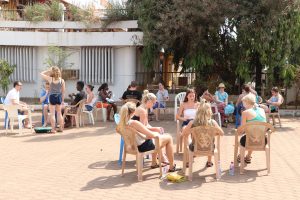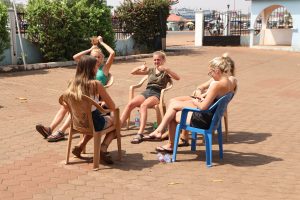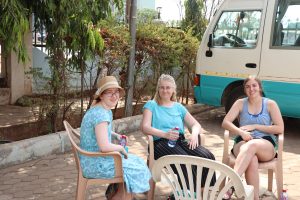Blogpost January 16th 2019
Today, we got breakfast as usual and then headed to the hotel courtyard for a discussion about the assigned readings by by J. D Fage and Walter Rodney. We split into two groups, and argued for both sides.

One group focused on Fage’s assertion and whether or not slavery and the slave trade was indigenous, widespread and natural to Africa before European encounter. In the end, it comes down to definition, and how slavery is defined. Fage, argues that slavery started within West Africa before the slave trade and that Europeans simply tapped into an already market and that slavery and the slave trade did not adversely affect demographic balance in Africa. This was highly contested especially in regard to his timing and sources, which were mostly Portuguese.

The other group examined Walter Rodney’s argument that the slave trade changed the form of servitude within Africa, in direct contradiction to the assertions of Fage. Rodney, a Guyanese activist, claimed slavery was not indigenous to Africa, and that although they had other forms of servitude, the slave trade transformed and introduced a new form of servitude, after all the term slave did not originate in Africa. For Rodney, European and Arab contact simply transformed a humane and aspects of an African culture into what would be termed slavery and the slave trade. Rodney also had issues of over generalization.

We also discussed historical truth, and the importance of analyzing narratives such as Alhaji Yakubu of Salaga and the main points of his father’s story as someone being captured from a royal house.
The most important issue in the news for the day was about the overlord of the Gonga kingdom, Yagbonwura Sulemana Jakpa Tutumva who expressed his preference for Damongo as the choice for the regional capital of the Savannah region. Establishing of Damango as the regional capital ends a dispute between the youth of Damango and Salaga (where we visited recently) for the choice of location.
Additionally, The Ghanaian government set up a committee to review the development plans for the six new regions from the 27th of 2018 referendum. Gonjalanders are currently creating framework for the new regional capital and development for the people within the region.
After that, we took a highly anticipated trip to the market to purchase traditional African fabrics with more colors and patterns than you could ever imagine. Prof. Abdulai brought us to his favorite tailor, and many students were measured for skirts, pants, headbands, etc. Our group will look fresh in the new attire upon arrival to St. Olaf.
We made our way over to the daily lunch spot, and chowed down on some kelewele (fried plantains), rice, noodles, special sauce, and chicken with a side of hibiscus juice (yum). Post lunch, some relaxed and played cards while others played with a few of the local kids we see everyday.
In the afternoon, students took naps and a few made their way to a grocery store or gas station for a few snacks. We chilled on top of the bus and listened to music after the majority of people woke up from naps. Morgan and Vanessa ran/walked in circles around the courtyard to get a few more steps in while others watched and wished they had joined.
We ended our night with crisp pineapple and tangy mango at the top of our Ghanaian hostel.
Vanessa, Morgan, Kristina, Ella
